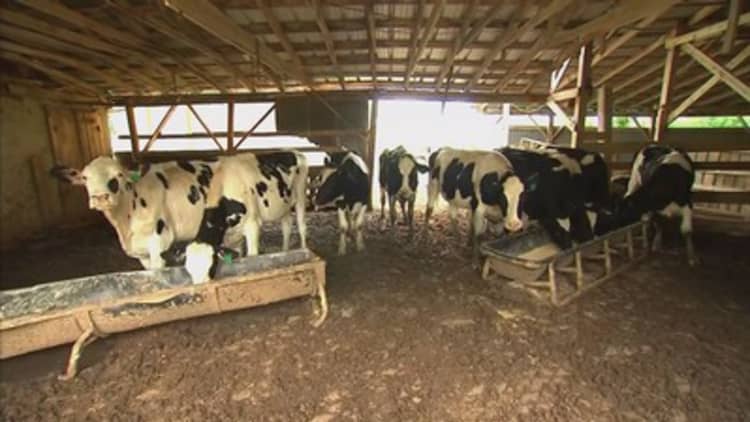
Ninety days ago, Carilynn and Curtis Coombs got some unwelcome news.
The Smithfield, Kentucky, dairy farmers were losing their contract with Dean Foods. It came as a shock to the couple, the third generation working on Jericho Acres Dairy, which has been in the family for more than half a century. It's a small farm, but the foundation for some big dreams.
"It was all about continuing the family business, doing continuous improvements to our facilities, growing our herd to include better genetics, better cows," said Carilynn.
Those dreams were disrupted by the letter from Dean Foods, which buys all their milk.
It read in part: "While we greatly appreciate all your hard work and the milk you have provided to Dean Foods throughout the years, I regret to notify you we must cease purchasing milk from your dairy farm. Our agreement will end in 90 days."
More than 100 farmers in eight states got the same letter. Competition, market conditions and shrinking sales of milk are having a big impact on farmers like the Coombs family.
For its own part, Dean Foods says competition is partly to blame.
"First and foremost, a retailer's new class one fluid processing plant is coming online in the region, significantly decreasing our production as milk volume is moved from our facility to this new plant," the letter said.
While Dean Foods didn't name names, Walmart is entering the processing businesses with a plant in Fort Wayne, Indiana. It will bottle milk for its own Great Value store brand, sourcing milk mainly from three nearby co-ops and a handful of independent farmers.
Dean Foods, facing falling sales and profits, says it's focusing on "right-sizing its network to better match volume." It will continue processing milk for Walmart stores in other regions. But the competition's likely to increase, with other big grocers like Kroger already in the processing game.
Walmart told us in a statement: "Each farm that will be supplying milk to our facility is within 210 miles of the plant. While many of the farms that received letters from Dean Foods were far outside of the service area of our plant, a number of them closer to Fort Wayne have signed contracts with the cooperatives to work with Walmart."
Walmart also points out that supply chain efficiency allows it to pass savings on to customers.
In addition to competition, the Dean Foods letter also cited market conditions.
At a national average of $3.23 a gallon, retail milk prices are lower now than 10 years ago, according to the U.S. Bureau of Labor Statistics.
That's bad news for farmers, who have already been struggling with prices so low, it's hard to make a profit.
Plus, Americans are moving on from milk. Consumption has been dropping steadily, with overall sales falling about 13 percent in the last decade.
Curtis and Carilynn know that — they were working on strategies to turn a profit, despite the lagging taste for milk.
"We knew we would do something a little bit different, whether that be value added, or agri-tourism or bottling our own product," Carilynn said.
But those plans all included building their herd significantly. Instead, with no new buyer on the horizon, the Coombs are culling their cows. Since the arrival of the Dean Foods letter in March, they've sold more than half the herd to other dairies or to meat processors. They're down to about three dozen dairy cows, from a peak of 100.
"It was heartbreaking to watch, my husband and all of our hard work get loaded up on a trailer," Carilynn said. "These animals are an extended part of our family."
"It's devastating," Curtis said, getting emotional. "My son told me the other day after the cows left, he said, 'uh, are the cows gone?' I said 'yeah.' He said, 'I'll go find them for you.' You know, we'll always have a farm and he'll always get to drive the tractors and probably work cows, but it just won't be the same."
Of the 20 Kentucky farms that had their contracts canceled by Dean Foods, 14 still have found no new buyer for their milk. The other six have already sold out.
That's part of a trend that has seen the number of dairy farms in the U.S. drop by half since 2000, from more than 83,000 to about 40,000, according to the U.S. Department of Agriculture.
Carilynn points out the impact will be felt way beyond the families who've lost their market.
"We put a lot of investment in our local community. So direct impact, it's going to impact our veterinarian, it's going to impact our seed company and our feed company, any time we buy parts that goes into the local community, and that's just direct," she aid.
For now, Jericho Acres Dairy has been given a reprieve, a contract extension of 30 days to try to find a home for its milk. But the outlook is bleak.
"It's been very hard to imagine what this place would look like without dairy cows," Curtis said. But "we can't keep milking without a market."


